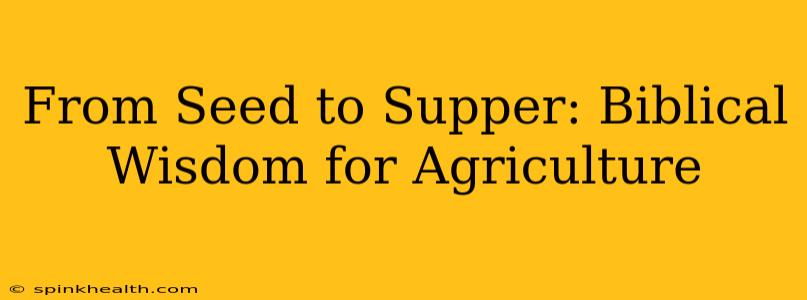For millennia, agriculture has been intertwined with human civilization, providing sustenance and shaping societies. The Bible, a collection of texts spanning centuries, offers a rich tapestry of wisdom regarding agriculture, extending beyond mere practical advice to encompass ethical, spiritual, and societal dimensions. This exploration delves into the biblical perspective on farming, revealing timeless principles applicable even in today's modern agricultural landscape.
What Does the Bible Say About Farming?
The Bible portrays agriculture not just as a profession but as a sacred calling, a stewardship entrusted by God. Genesis 1:28 famously commands humanity to "be fruitful and multiply and fill the earth and subdue it, and have dominion over the fish of the sea and over the birds of the heavens and over every living thing that moves on the earth." This passage establishes humanity's role as caretakers of creation, responsible for cultivating and preserving the land. This responsibility isn't simply about maximizing yields but about cultivating a harmonious relationship with the earth and its resources. Throughout the Old Testament, we see numerous examples of agricultural practices, highlighting the importance of hard work, planning, and reliance on God's provision. The Promised Land, often depicted as a land "flowing with milk and honey," symbolizes abundance and prosperity, intrinsically linked to successful agriculture.
What are the Biblical Principles of Sustainable Agriculture?
The biblical model subtly advocates for principles that resonate strongly with contemporary sustainable agriculture. The Sabbath year, a period of fallow land mandated in Leviticus 25, demonstrates the importance of rest and regeneration for the soil. This practice, far from being mere ritual, reflects an understanding of the land's inherent limits and the need for responsible resource management. The concept of gleaning, where the poor and marginalized were allowed to gather leftover crops after harvest, highlights a commitment to social justice and equitable distribution of resources. These principles challenge modern intensive farming practices, urging us to consider the long-term health of the ecosystem and the well-being of all members of society.
What are the benefits of sustainable farming practices?
Sustainable farming practices, echoing biblical principles, offer numerous benefits. They enhance soil health, leading to increased fertility and reduced reliance on chemical fertilizers. They promote biodiversity, fostering resilience against pests and diseases. Moreover, they contribute to a healthier environment, reducing water pollution and greenhouse gas emissions. Finally, sustainable practices often lead to a more equitable distribution of wealth and resources within agricultural communities.
How Can We Apply Biblical Principles to Modern Farming?
Applying biblical principles to modern agriculture requires a thoughtful and holistic approach. It involves embracing sustainable practices that prioritize soil health, biodiversity, and resource conservation. It also demands a commitment to ethical labor practices and fair pricing mechanisms that benefit all stakeholders. This might mean choosing organic farming methods, supporting local farmers' markets, or advocating for policies that protect small-scale farmers and promote sustainable land management. Ultimately, it is about recognizing that our relationship with the land is a sacred trust, a responsibility to nurture and protect creation for present and future generations.
How important is prayer in farming?
Throughout the Bible, we see countless examples of reliance on God for provision and protection. For farmers, this translates into acknowledging the limitations of human control and seeking God's guidance in all aspects of the agricultural process. Prayer isn't a replacement for sound agricultural practices but a crucial complement, acknowledging that ultimate success depends on a higher power. Prayer becomes a recognition of our dependence on God's grace and a constant seeking of His wisdom in managing the land.
Conclusion: A Harvest of Wisdom
From seed to supper, the biblical narrative provides a rich source of wisdom for agriculture. By embracing the principles of stewardship, sustainability, and social justice embedded within biblical texts, we can cultivate a more ethical, environmentally responsible, and spiritually fulfilling approach to farming. It's a call to cultivate not just crops, but also a deeper relationship with the land, with our fellow humans, and with the divine source of all creation.

